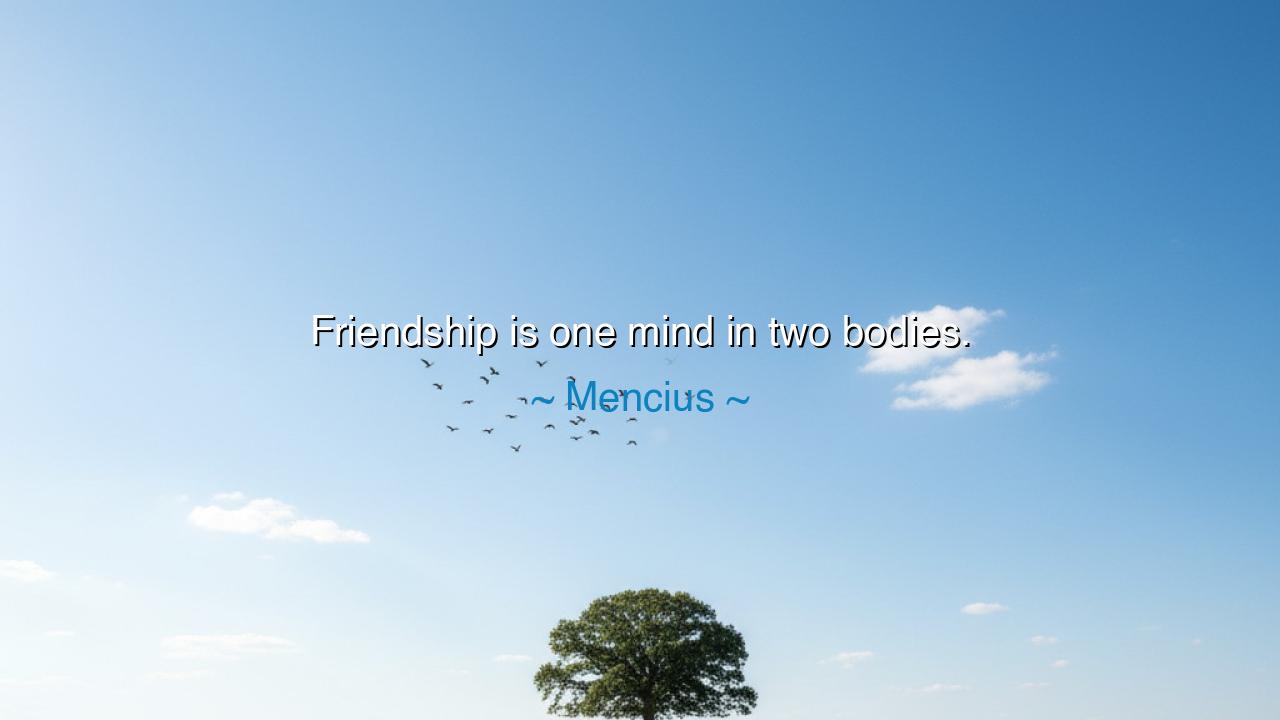
Friendship is one mind in two bodies.






"Friendship is one mind in two bodies." Thus spoke Mencius, the great disciple of Confucius and one of the most luminous sages of ancient China. In these few words, he captures a truth as enduring as the mountains and as subtle as the wind — that true friendship is not merely an alliance of convenience or affection, but a union of souls, a harmony so deep that two hearts beat in a single rhythm and two minds share one understanding. It is not the bond of similarity alone, but of shared virtue, where each friend becomes a mirror of the other’s best self.
Mencius lived in an age of turmoil — the Warring States period, when kingdoms battled for power and men often traded loyalty for gain. Amid such strife, he taught the primacy of benevolence, righteousness, and human-heartedness. His vision of friendship was rooted in the Confucian ideal: that moral cultivation binds souls more strongly than blood or fate. To him, a true friend was not one who merely shared laughter, but one who shared principle — who saw through the veil of the self to recognize the divine spark within the other. When two such souls meet, their thoughts intertwine like twin flames, and what one feels, the other already knows. Hence his saying: "Friendship is one mind in two bodies."
This unity, however, is not born of dependence, but of mutual elevation. Each friend calls forth the other’s nobility. They do not consume each other’s strength, but multiply it. Their thoughts flow as one river — two streams joining into a single current of truth. In such a bond, there is no need for pretense, for both hearts dwell in the same understanding. They need not always speak; their silence, too, is eloquent. When one suffers, the other feels it without words; when one rejoices, the other’s spirit soars in harmony. This is the oneness of friendship, not imposed by will, but born of shared virtue and sincerity.
The ancient annals tell us of the friendship between Guan Zhong and Bao Shuya, two men of early China whose bond became the measure of loyalty and trust. Guan Zhong once betrayed Bao Shuya in pursuit of power, yet when fortune reversed and Guan Zhong fell, Bao Shuya interceded for his life, saying, “I know him better than he knows himself.” Their ruler, moved by Bao’s faith, spared Guan Zhong, who later rose to greatness and reformed the state of Qi. Throughout their lives, Guan Zhong declared, “I am alive because of Bao Shuya.” Such was their union — one mind in two bodies, where forgiveness, understanding, and loyalty surpassed pride and ambition.
This ideal of friendship transcends time and culture. The Greeks, too, spoke of such bonds. Aristotle, centuries after Mencius, described the same truth in his doctrine of philia: that the highest friendship is founded on virtue, where each friend loves the other for the good that dwells within. Thus, the wisdom of East and West converges — the recognition that friendship is not about possession or utility, but about recognition: the seeing of oneself in another, and the mutual striving toward goodness.
Yet such friendship is rare and precious, for it demands not flattery, but truth; not comfort, but courage. It cannot exist where envy, deceit, or vanity linger. To achieve oneness of mind, both friends must cultivate humility — the willingness to listen, to forgive, and to see beyond the surface of things. This harmony cannot be forced by affection alone; it must be nurtured through virtue. A friendship without righteousness is like a bridge built on sand — it collapses with the first tide. But a friendship grounded in virtue endures storms and time alike, unbroken and unshaken.
Lesson: To find such friendship is to find another self. It is not given by chance, but earned through character. Be the kind of person who inspires friendship through integrity, honesty, and compassion, and such a bond will come to you. Cherish it, for it is among the rarest treasures of life — a mirror in which your better nature shines.
Practical action: Seek not many friends, but a few of true heart. Cultivate patience, understanding, and sincerity in all your dealings. When you speak, speak truth; when you listen, listen with the heart. Be loyal, even in silence; be kind, even in correction. For as Mencius teaches, when two souls walk the same path of virtue, their minds become one — and in that sacred unity, friendship becomes not merely a bond between people, but a reflection of the harmony of Heaven itself.






AAdministratorAdministrator
Welcome, honored guests. Please leave a comment, we will respond soon